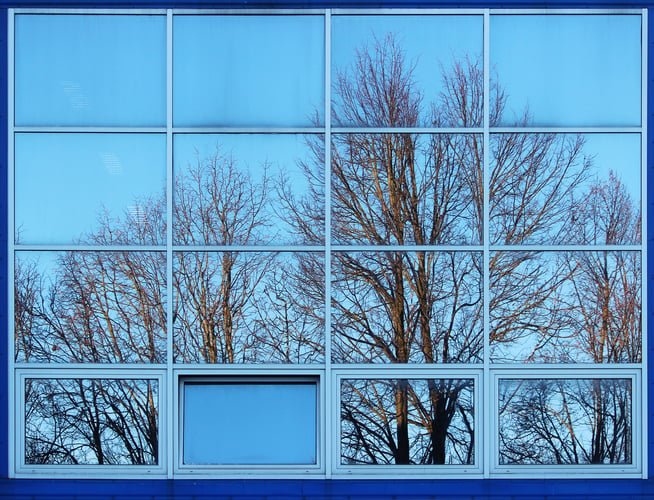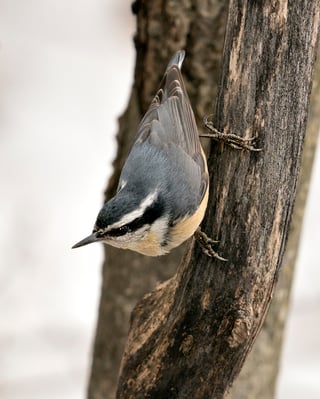I’m no expert birder, but slowing down to watch birds is one of my favorite morning activities. As they chatter and flit around my neighborhood, I am amazed that such small-bodied beings can survive the myriad challenges of our harsh alpine environment. Cold temperatures and lack of food make for a formidable winter, but it turns out that one of the biggest threats to their lives is the pane of glass that I look through to watch them.
Birds—a lot of birds—fatally collide with windows. Reflective surfaces look like spaces they can fly through. Thinking they’re headed for trees or open sky, they hit the unforgiving glass at full speed. A 2014 study by the Cooper Ornithological Society and Smithsonian Institute estimated that, on average, 2.1 birds are killed at each US residence per year. Consider that there are now approximately 129 million single-family homes in the US—that is a huge number of lives lost. Add in high-rise buildings, and the estimate climbs to 365-988 million birds killed every year. Many more are seriously injured.

Birds mistake reflections for habitat they can fly toward, resulting in fatal collisions.
Personally, I’d like to make birds’ lives a little easier so we can continue to share our community with them. Colorado is home to more than 400 bird species, each with their own magnificent way of life. Ruby-throated hummingbirds trill through Colorado in the summer, journeying across the Gulf of Mexico to spend every winter in Mexico or Central America—a massive trek for a tiny bird. Red-breasted nuthatches, on the other hand, stay in Colorado year-round, eking out a living by climbing down trees headfirst to find food that other birds missed. During the 2023 Christmas Bird Count—a national effort that has been running since 1900—observers in Eagle County spotted 1,471 individual birds during a 4-hour observation period.
Fortunately, there are many ways to make your windows more visible to birds—less reflection means less confusion. Take an inventory of your house from the outside. Which windows are the most reflective, or closest to bird habitat? Start with those. The cheapest, easiest solution is to let your windows get dirty. If you’d like to keep your windows clean, you can install aesthetically pleasing patterns using paint, paracord, or commercially available stickers. Space them 2-4 inches apart to tell a bird that they are unable to fit through. One common product on the market is ultraviolet light decals, which appear translucent to people but bright to birds who can see UV light—just make sure you space them correctly and replace them regularly. The Audubon Society also recommends installing screens, moving houseplants away from windows, and placing feeders directly on windows (or farther than 30 feet away). Turn off external lights and close your blinds at night, especially during spring and fall migration periods.
If you happen upon an injured bird, call a local rehabilitation organization or state wildlife agency that can provide you with guidance. If the bird is dead, check its ankle for a band. Scientists use these little metal anklets to understand bird populations. You can remove it to find the organization that banded the bird. Contacting this organization will provide them with information about the bird and help their scientific research.
 Red-breasted nuthatches stay in Colorado year-round.
Red-breasted nuthatches stay in Colorado year-round.
Next time you’re sipping on a hot cup of coffee or tea, and see a bird out the window, take a minute to think about these small steps you could take to make the window safer for that bird. These fun, curious creatures deserve to share a safe home in the mountains with us. Our sweet Colorado songbirds thank you.
Written by Erin Baumann Walking Mountain’s Sowing Seeds Program Manager. While she doesn’t consider herself an expert birder, she is very fond of drinking a morning coffee while watching the birds in her neighborhood.







